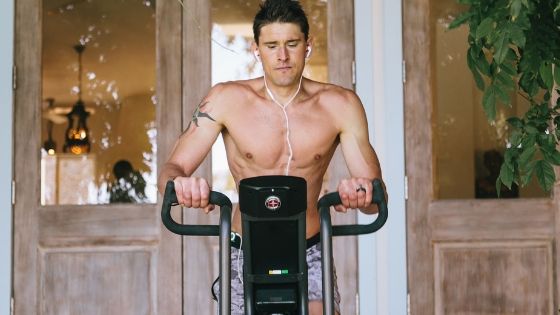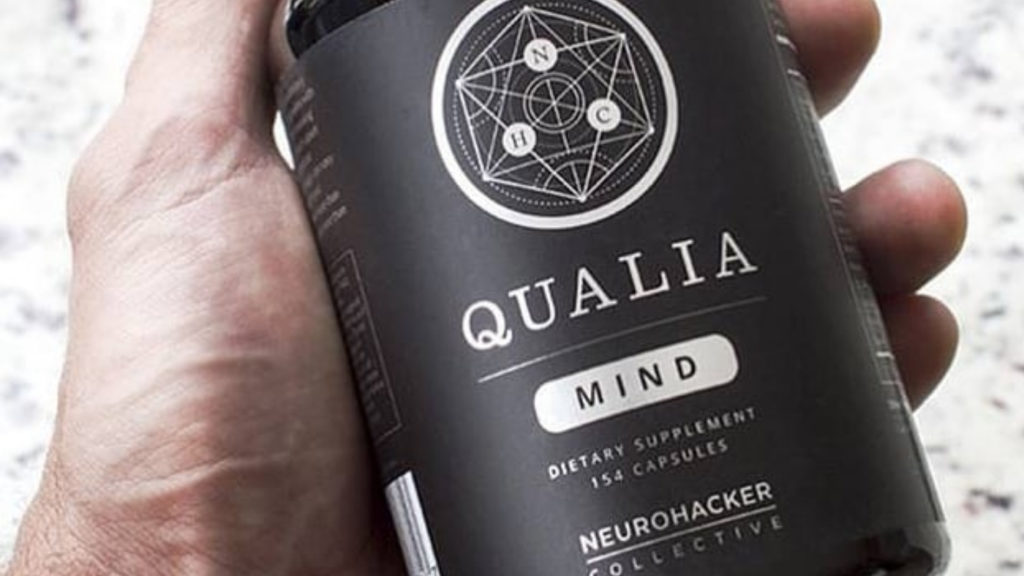June 18, 2019
If you tuned into the podcast last week, then you may have heard my episode with Jim Poole of NuCalm, entitled “How To Simulate A Full Sleep Cycle In 20 Minutes, The Best Stress Biohack That Exists, Vagus Nerve Stimulation & Much More!“
During that episode, we talk about one of my favorite biohacks of late: a very handy device called the NuCalm, which I've been using to simulate an entire 120-minute sleep cycle with just a 20-minute daily power nap.
The NuCalm is a next-level cranial electrotherapy stimulation device that uses both a relaxation cream and mild stimulation to help your brain interrupt the adrenaline and cortisol release by mimicking what naturally occurs in your brain right before you sleep. It includes an app with “music” – which is actually neuroacoustic software that delivers frequencies to your brain which take you down to theta brain wavelength. This thing allows me to get a 20-minute intense period of relaxation even when I can’t nap, and I’m now ducking away and using it nearly every day, particularly during travel and on airplanes. It’s spendy, but in my opinion, well worth it.
The NuCalm also comes with a built-in feature called “Ignite,” which was originally designed for pro athletes and elite military personnel to activate the sympathetic nervous system and to put the body in a fully aroused, battle-ready state.
But my conversation with Jim got me thinking. Are there other similar mind-hacks for enhanced exercise motivation? The answer is yes, and below, you will find just a few of my favorites.
In the comments section below this post, I'd love to hear what you would add to the list. How do you motivate yourself to get up and going when your body feels blah or your brain feels sluggish in the morning or at the end of a long day at the office? What are your own favorite tips, tricks, and hacks to enhance exercise motivation? After reading my tips below, feel free to add your own thoughts in the comments section.
Why Your Brain Doesn't Want You To Push Hard
We’ve all been there before – your training plan for the day, your coach, your personal trainer or whatever routine you are following calls for a tough exercise session – but you’re just too mentally exhausted to workout. Perhaps you had a stressful day at work, a tough day with the kids or too many exhausting mental tasks to handle. Maybe you actually do make it to your workout, but your thinking is so fuzzy and your brain is so tired that all you can do is slog away junk mileage on the treadmill or bike, or swim lazy laps in the pools.
This lack of motivation isn’t a figment of your imagination.
Studies have actually shown that the type of exhaustion that accompanies difficult mental tasks (i.e. a hard day at work) can indeed decrease exercise motivation and performance. This problem can be compounded if the neurons in your brain are sluggishly transmitting signals due to fatty acid deficiencies; your motivating neurotransmitters like dopamine and glutamate are low due to underproduction of a compound called acetylcholine, or your mind is simply not trained to handle complex tasks.
For example, the recent research entitled “Drive in Sports: How Mental Fatigue Affects Endurance Performance,” highlights the issue as follows:
“Performance in endurance sports relies on athletes’ drive, which is the sum of all factors pushing athletes to exert effort during exercise. Mental fatigue can influence endurance performance by decreasing athletes’ drive to exercise. From a psychological point of view, mental fatigue has two separate components: it can affect drive by increasing the perceived effort necessary for a given task (“I cannot do this, I am too exhausted”), or by decreasing the perceived value of the reward that can be obtained (“I do not want to do this, it is not worth it”). Neurophysiological theories confirm this dual nature of mental fatigue. It is suggested that mental fatigue can activate the inhibition centers of the brain, increasing perceived effort for a given task, hence decreasing drive and willingness to act. On the other hand, it may also deactivate facilitative brain centers (normally responsible for motivated behavior and increased drive toward a reward), also resulting in decreased drive.”
Another research review entitled “Prior Acute Mental Exertion in Exercise and Sport” points out that:
“Mental exertion is a psychophysiological state caused by sustained and prolonged cognitive activity. The understanding of the possible effects of acute mental exertion on physical performance, and their physiological and psychological responses are of great importance for the performance of different occupations, such as military, construction workers, athletes (professional or recreational) or simply practicing regular exercise, since these occupations often combine physical and mental tasks while performing their activities. However, the effects of implementation of a cognitive task on responses to aerobic exercise and sports are poorly understood. Our narrative review aims to provide information on the current research related to the effects of prior acute mental fatigue on physical performance and their physiological and psychological responses associated with exercise and sports.“
This review concluded that prior acute mental exertion affects effectively the physiological and psychophysiological responses during the cognitive task, and performance in exercise.
But the good news is that by using practical lifestyle tips, supplements, and brain training, you can hack your mind to not only become smarter, but also to improve exercise motivation. In this article, you’ll learn about how to get your brain to operate at peak efficiency so that you can not only get yourself out to the door to exercise, but also compete at peak mental efficiency.
Simple Hacks To Increase Your Mental Motivation To Exercise
1. Pay Attention To Light
If you find yourself experiencing an afternoon drop in alertness and focus, this can often be due to excessive melatonin, which can induce sleepiness. The type of circadian rhythm interruption that would cause you to be producing excessive melatonin this early in the day – before you’re supposed to be naturally entering your sleep cycle – is typically due to a disruption in your circadian rhythm earlier in the day, or the night before.
The solution to excessive melatonin is to advance the heaviest part of the melatonin cycle so that it occurs before you wake up in the morning. This is achieved by limiting light exposure the night before. You can do this on any day after the sun goes down by:
- using glasses with an orange tint (called “blue light blockers”).
- placing blue light blocking covers and/or installing blue light blocking software on your computer (Iris) or television (Drift).
- dimming the lights in your home, using red incandescent bulbs and turning off any unnecessary lights.
- avoiding phone, computer or television exposure in your bedroom.
- exposing yourself to natural sunlight as soon as possible upon waking.
As you can probably imagine, stabilizing melatonin is of even greater importance the night prior to a competition. If you want to take this one step further, you can actually expose yourself to copious amounts of bright sunlight and even artificial blue light in the morning hours. Here's an entire article I've written on how to do just that.
2. Moderate Caffeine Intake
100 milligrams of caffeine, which is approximately the amount you’ll get in an average cup of black coffee, has been proven to improve memory recall and cognitive fatigue. The way that caffeine (and many other “psychostimulants”) achieves this effect is to block a receptor in your central nervous system that is responsible for binding a compound called adenosine. When you inhibit adenosine, you get increased activity of dopamine and glutamate, two neurotransmitters responsible for enhancing a feel-good mood, mental energy, and focus.
However, most of us are unresponsive to these brain-boosting effects of caffeine because we simply drink too much coffee. Not only can higher doses of caffeine decrease blood flow to your brain, but you can quickly build up a tolerance. The solution is to limit yourself to just 8-12 ounces of strategically timed coffee during the day and to avoid coffee on at least two days of the week (also known as “caffeine cycling”). Furthermore, you should use fresh, high-quality coffee from arabica beans, and not coffee powders or robusta coffee, since these cheaper, processed coffees are high in mycotoxins, which can actually give you “fuzzy thinking” and leave you worse than you felt prior to drinking the coffee.
During a longer race or competition, you can use caffeinated gels, drinks or powders, but you should implement small frequent doses throughout the event, rather than large doses that are irregularly timed, since this can cause an excessive central nervous system response that may leave you feeling jittery, light-headed or unable to focus.
3. Music
Music has been proven in studies to help you exercise harder, and most of us have felt the energy-boosting effects of pumping up our favorite tunes when the going gets hard during a workout. In addition to helping you exercise harder, music has also been shown to assist with “dopaminergic neurotransmission,” which basically means it can cause a dopamine release in your brain that may make your more mentally responsive and motivated to exercise.
It sounds like a no-brainer (pun intended), but something as simple as turning on your favorite song can vastly improve your workout focus and quality. Although personal music devices are banned in most races, you can still benefit from humming, imagining, or singing your favorite song when you’re suffering in competition – and this is even easier if you listen to that song in transition prior to the race.
4. Supplement
Vitamin D is one effective supplement you can use to support your brain during workouts. There are receptors for Vitamin D in your central nervous system and in the hippocampus region of the brain, which is responsible for memory and spatial recognition. In these areas, Vitamin D protects neurons and also regulates enzymes in your brain and cerebrospinal fluid that are involved in neurotransmitter synthesis and nerve growth. Vitamin D deficiencies are directly correlated to poor performance on cognitive function and a slower ability to process information, which can directly influence your workout and race performance.
If you live in a sunny area and get adequate sunlight, you should consider getting a 25-hydroxy Vitamin D test like the WellnessFX Longevity Blood Testing Panel for Men or Women just to double check your levels, which should ideally be in the range of 40 to 80 ng/mL. If you’re in a northern climate or get limited sun exposure, you can almost guarantee that you are deficient, and can include a few teaspoons of cod liver oil frequently in your diet, try to have more beef and butter, and take approximately 4000-6000 daily units of Vitamin D3/K2 blend (I prefer Thorne brand).
Another important supplement is fatty acids. Electrical signals used in thought, memory, and processing bounce around in your brain and get transferred from one brain cell to another via a point called a synapse, where the signals cross a physical channel before moving on to the next neuron. The walls that these signals need to pass through are comprised of cell membranes made up of about 20% essential fatty acids, which you’ll find in Omega-3 fatty acid rich compounds such as fish oil.
Next, a substance called arachidonic acid is one of the most abundant fatty acids in the brain and is crucial your neurological health, since it helps build the cell membranes in your hippocampus, helps protect your brain from free radical damage, and activates proteins that are responsible for growth and repair of neurons in your brain.
Alpha-Lipoic Acid (also known as “ALA”) is another fatty acid that can protect neurological decline and enhance mental function. It can easily cross the blood-brain barrier (a wall of tiny vessels and structural cells that protect your brain) and pass into the brain to have a neuroprotective effect.
Finally, a type of fat compound called phosphatidylserine is found in abundance in neural tissue, where it serves as a structural component of cell membranes, and also as an inhibitor of acetylcholine, which allows it to increase alertness. Phosphatidylserine has been shown to improve memory and spatial recognition, and may also improve cognitive performance and memory.
You can get Omega-3 fatty acids by eating foods such as fish and walnuts regularly and taking 1-2 grams of a triglyceride-based fish oil daily; you’ll find fatty acids such as arachidonic acid in Tilapia, catfish, yellowtail and mackerel, fatty cuts of meat, duck, eggs, and dairy. You can take alpha-lipoic acid as about 100-500mg per day in supplement form, and you can find phosphatidylserine in cold-water fish like herring and mackerel.
Probably my favorite all-encompassing strategy to get all forms of plant and fish based fats is to take 10-12 softgel capsules of Superessentials oil on any hard workout days.
Chinese adaptogenic herbs can also be quite effective. A supplement called “Huperzine”, which can increase the amount of the neurotransmitter acetylcholine rushing around in your brain, and thus enhance the release of the motivating molecules dopamine and glutamate, was made incredibly popular in Western culture by Tim Ferriss’ “Four Hour Body” book. But Oriental medicine has known about Huperzine (found in club moss), and other similar focus-enhancing compounds for thousands of years, and you can get even better effects with a Chinese adaptogenic herb complex.
For example, in the afternoons prior to your key workout, you can ingest on an empty stomach a high-quality adaptogenic herb complex called “TianChi,” which includes fresh substances like Ashwagandha, Reishi mushroom extract, Eleuthero and Gotu Kola – and this can vastly improve focus and mental capacity prior to exercise.
These type of herb complexes are easy on the stomach and can be consumed about 30-45 minutes prior to a race to enhance mental function during the event. Just make sure you get the fresh stuff, as most herb complexes are sitting in big bins in China, getting sprayed with ethylene oxide and losing nearly all their potency before you get them.
Finally, there are essential amino acids, which, as you learn in this comprehensive podcast I recently released, can stave of central nervous system fatigue during exercise, specifically at a dose of 5-10g pre-workout, and another 5-10g for each hour during a longer workout.
5. Biofeedback
Zen-trained meditation masters are able to regulate a specific type of brain wave called an “alpha wave” during meditation. This wavelength is associated with attention, focus, and enhanced cognitive function. Alpha brain waves, which are abundant during meditation, allow one to have increased relaxation, decreased tension and anxiety, and a lowering of a fear-response – which many athletes sometimes feel prior to a race or hard workout.
But you don’t need to spend over a decade becoming a master meditator to teach yourself how to regulate the production of alpha waves in your brain. You can actually achieve a similar effect via the use of a biofeedback device.
Such a device typically operates by measuring electromagnetic energy in your brain through tiny detection devices placed on your head. These energy detection devices contain a computer chip that picks up the tiny current in your brain, then replicates them in a waveform on a computer screen.
Once you see your brain waves, you begin to identify breathing patterns and thoughts that can affect alpha wave production and choose from the biofeedback device a series of protocols that can help you consciously train your brain to achieve the ideal wavelengths.
There are a large number of biofeedback devices now on the market, with a few of my favorites being the Muse2, the DAVID Delight Pro by Mind Alive, the Oura ring Moment feature, the HeartMath EmWave, and the NatureBeat app paired with a Viiiiva heart rate monitor. You can also search for a qualified biofeedback practitioner in your area by visiting aapb.org.
6. Brain Aerobics
There is continuing research that doing brain aerobic exercises can help to “age-proof” your brain and slow the onset of symptoms of brain aging and can also help to keep your brain functioning at peak capacity. Perhaps the most popular form of this brain training is the game like Sudoku, but there are a variety of other brain-training games you can find in places like the iTunes app store, or by simply doing a search for “brain training games” online. To qualify as a good brain aerobics exercise, an activity must have novelty, variety, and challenge, so you need to switch up the brain training exercises that you use. For a handy little brain aerobics book, you can also check out the book “Brain Benders” by Dr. Arlene Taylor.
Warning: you shouldn’t do brain-training prior to a workout or race, since it can negatively affect exercise function, but you can instead do it a separate time of day or on a rest day to improve your ability to handle complex mental tasks or improve focus during a workout or race.
Summary
You don’t necessarily need to implement all the mind-hacks in this article to enhance your focus during workouts, competitions, and races; you’ll notice results even if you simply choose a few.
For example, you can be sure to include high-fat foods in your diet, such as fish and walnuts, drink small amounts of coffee in the morning, and use adaptogenic herbs in the afternoon, pick up chess or Sudoku as a hobby, and limit your exposure to synthetic lighting in the evening. You’ll find that with just a few mind-hacking changes, your workout and exercise motivation and focus can vastly improve.
And if you haven't had a chance to check out last week's NuCalm podcast, it's worth a listen too, as we delve more deeply into this topic.
Now it's your turn. How do you motivate yourself to get up and going when your body feels blah or your brain feels sluggish in the morning or at the end of a long day at the office? What are your own favorite tips, tricks, and hacks to enhance exercise motivation? After reading my tips below, feel free to add your own thoughts in the comments section.














I appreciate your suggestions. A cardio block is a key component of almost all complex workouts. Although cardio is essential for achieving a perfect body, coaches and instructors stress the importance of this component. It is crucial to select the right products and exercises in order to achieve more. I also agree about a cold shower – a really worthwhile thing.
I have thought so many times of entering the blogging world as I love reading them. I think I finally have the courage to give it a try. Thank you so much for all of the ideas!
Thanks for sharing this interesting article!
Thank you for your recommendations! Almost all complex workouts, regardless of their purpose – weight loss, maintaining muscle tone, weight gain, contain a cardio block. Coaches and instructors insist on the need for this part of the workout, but warn that cardio alone will not achieve an ideal body. I think that it is important to choose the right set of products, exercises to get more
Cold shower, screaming, clapping, breathing, hyping myself in any primal way usually helps, at least for some time. Also informations, reading about exercises and stuff, fine tuning my workout plan.
It will not sounds popular but what motivates me is…. Instagram! :) I practice pole dance and seeing all those amazing people doing all those amazing things makes me move my ass and practice harder! :) Event thou I can’t do 99% of what they do on Instagram this 1% makes me so happy and proud! :)
And then Ben I’m reading yours articles and listen to your podcast to make sure that I can do my pole dance stuff as long as possible and perform as best as possible. Take care of my recovery etc ;) So thank you for all your amazing job!!!
Great article,
You mentioned “due to fatty acid deficiencies” could this be a way to improve motivation or performance at the end of the day by improving fatty acids in the brain?
Regards Vince
Hi Ben! Would you recommend purchasing a massage gun or would my money be better spent on another recovery device? I’m looking for something to increase my range of motion and receive tight muscles.
Thanks,
Trevor
I take 1/2 tsp of creatine monohydrate or 1 Tbsp MCT (brain octane oil). Either one is like a dose of brain stimulation and keeps me going.